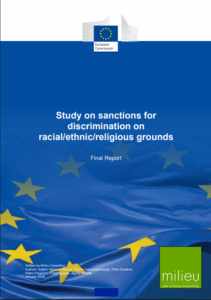 The Report, entitled ‘Study on sanctions for discrimination on racial/ethnic/religious grounds’, analyses in a very comprehensive way the judicial procedures that have been carried out in different member states.
The Report, entitled ‘Study on sanctions for discrimination on racial/ethnic/religious grounds’, analyses in a very comprehensive way the judicial procedures that have been carried out in different member states.
The report, published by the European Commission’s Directorate-General for Justice and Consumers, analyses how sanctions for racial, ethnic and religious discrimination are regulated and enforced in EU Member States under the Racial Equality Directive (RED) and the Employment Equality Directive (EED).
The study aims to assess the effectiveness of existing sanctions to combat discrimination in the EU, looking at punitive sanctions as well as compensatory and preventive sanctions. To this end, it uses examples from different EU countries, forming a report of enormous legal content and very valuable for gaining in-depth knowledge of the application of sanctions and the legal-administrative process for imposing them.
The methodology used for the elaboration of this report is noteworthy. The research is based on national legal analysis, interviews with stakeholders and a participatory event, covering all areas covered by the RED and EED directives.
The structure of the study is divided into 4 main sections, which comprehensively cover the whole sanctioning process and its consequences.
1. European regulatory framework
2. Recommended types of sanctions
3. Essential characteristics of sanctions
4. Recommendations for implementation
Finally, it includes a very practical section entitled outstanding good practices, among which we can highlight the following as common criteria:
- The need to have flexible legislation that allows for varied and adapted sanctions.
- The application of severe sanctions and proactive measures is necessary.
- Consistency in the imposition of sanctions is indispensable to ensure fairness and deterrence.
This study is part of the European Commission’s efforts to ensure full implementation of the Racial Equality Directive and the Employment Equality Directive in all Member States, thus contributing to the creation of a fairer and more inclusive Europe.
Similarly, a Guide to Good Practice on sanctions accompanies the above-mentioned report. This guide is very interesting as it focuses on key and practical aspects such as national examples and practices in other areas of European Union (EU) law, which can provide Member States with information on how sanctions are regulated or applied in different jurisdictions and areas of law, which could inspire changes in their own regulations and practices:
– Applicable EU legal requirements, including related interpretations by the Court of Justice of the European Union (CJEU) and, where relevant, standards set by the Council of Europe and the United Nations (UN).
– Key considerations for stakeholders (victims of discrimination; lawyers representing victims before courts and/or tribunals; courts and/or tribunals; public authorities responsible for drafting legislation and soft law measures on sanctions; equality bodies; non-governmental organisations (NGOs) and other organisations involved in bringing discrimination cases before courts and/or tribunals and/or supporting victims of discrimination) in overcoming the challenges.
Further infomation


